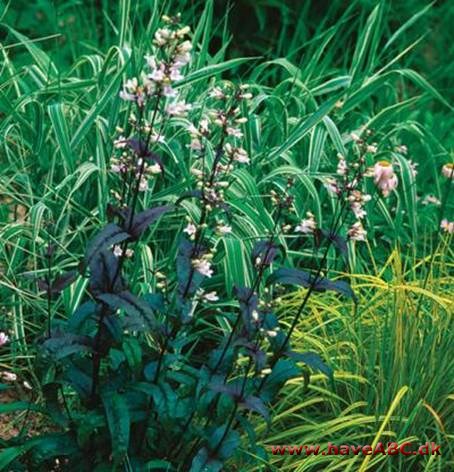
Penstemon digitalis 'Husker Red'
'Husker Red' is one of the few penstemons that does well in
wet winters and hot, humid summers. Ruby-toned leaves appear in spring,
followed in late spring and early summer by 3-foot-high stems adorned by
panicles of white blooms. The flowers attract bees, hummingbirds,
and butterflies, but the plants are not magnets for deer or rabbits. In autumn
and winter, songbirds feast on the seed. For a stunning display, plant 'Husker
Red' in groups.
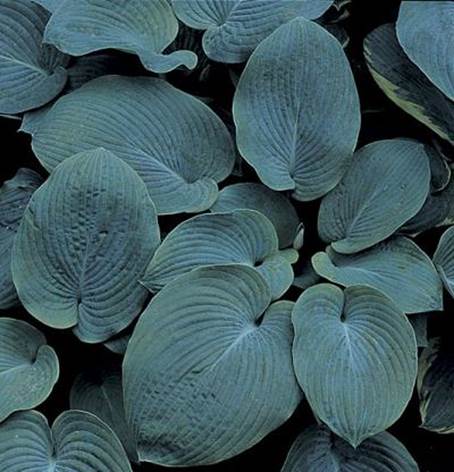
Hosta sieboldiana 'Elegans'
'Elegans' is a large hosta with deep, smoky blue, slightly
frosted heart-shaped foliage. Deep veins give the leaves a
corrugated look. White flowers bloom in early spring. Though slugs love hostas,
this one is usually spared. -
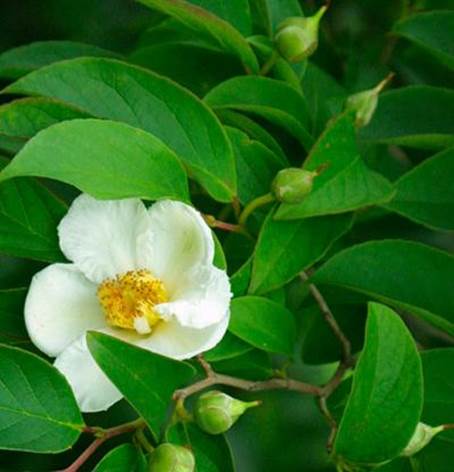
Stewartia pseudocamellia
A multi-stemmed, deciduous tree with a rounded columnar
form, stewartia features stunning bark that exfoliates in strips of gray,
orange, and reddish brown once the trunk attains a diameter of 2 to 3 inches.
Serrated foliage emerges bronzy purple in spring, develops into a dark green by
summer, and turns red or orange in the fall. In midsummer,
"glamorous" white camellia-like flowers open in random succession and
are followed by pointed brown seed pods, which are persistent but not very
ornamental.
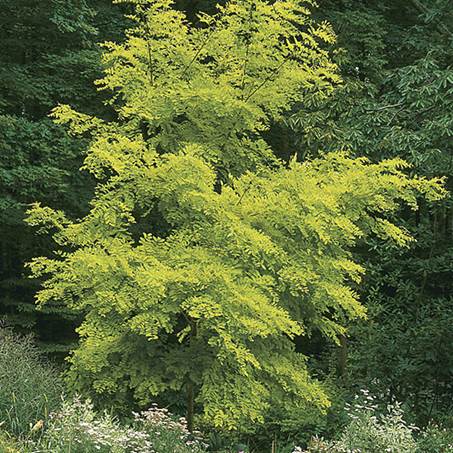
Robinia pseudoacacia 'Frisia'
This large, fast-growing tree has droopy leaves
that stay sunny yellow from spring until frost, spiny shoots, and fragrant
white flowers in late spring and early summer on pendent racemes. The flowers
are followed by smooth brown seed pods that are also interesting. 'Frisia' is
one of the cultivars that is grown more for foliage than for its flowers and it
does not flower as freely as the species.
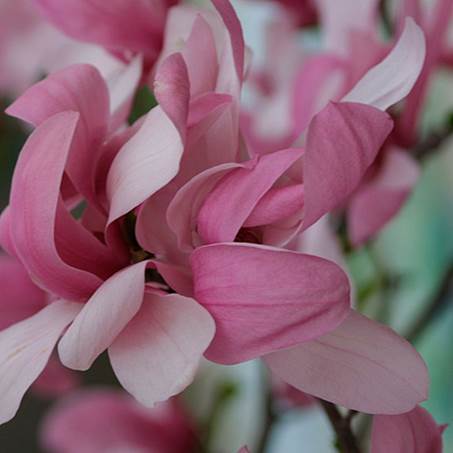
Magnolia 'Galaxy'
This deciduous hybrid offers candy-scented, goblet-shaped
blooms to 10 inches across in vivid reddish-purple. It forms a
pyramidal outline, and grows up to 40 feet tall.
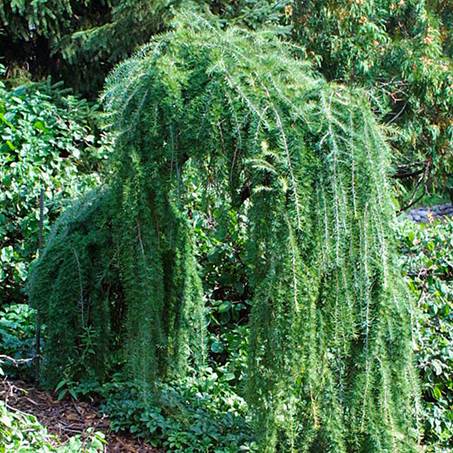
Larix decidua and cvs.
A deciduous conifer with a pyramidal growth habit, European
larch has pendulous lower branches. In spring, needles emerge a shiny
chartreuse, turning to deep green by summer and to sunset gold in late fall.
Cultivars include 'Pendula', a weeping cultivar; 'Fastigiata', a narrow and
upright variety; and 'Pyramidalis'.
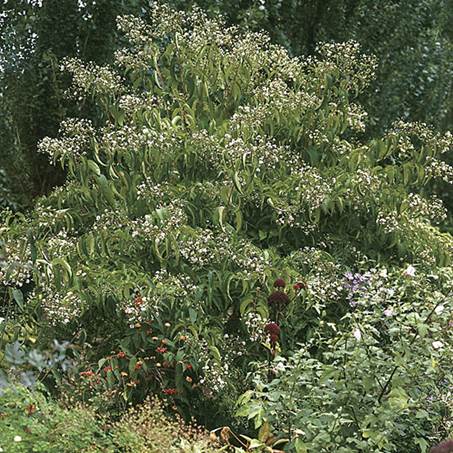
Heptacodium miconioides
The tiered branches of this fast-growing species are covered
with white blossoms for over a month, starting in late summer. The flowers fade
to reveal fuchsia calyxes that persist well into autumn. The pale, peeling
bark can be exposed by pruning the lower branches of the
interior. Although the form of the species is variable (single or
multi-stemmed), it can usually be pruned into an elegant vase-shaped specimen,
or maintained as a shrub.
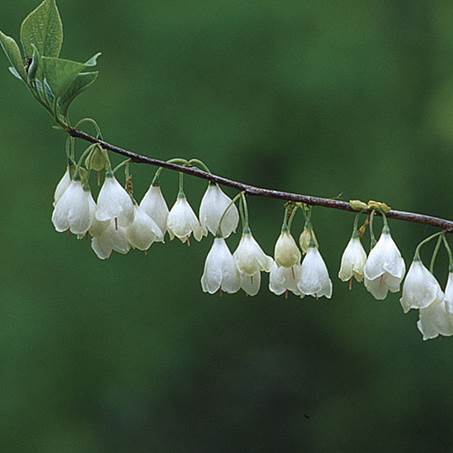
Halesia carolina
Carolina silverbell is a handsome tree with clean green
foliage and an upright spreading habit. In mid- or late spring, hundreds of
silvery-white bell-shaped flowers dangle from every branch before foliage
emerges. The tree also has attractive bark, unusual four-winged seedpods, and
yellow fall color.
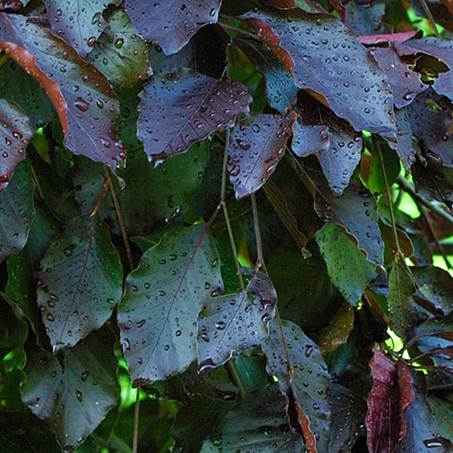
Fagus sylvatica 'Purple Fountain'
'Purple Fountain' is a deciduous, columnar,
dark-leaved tree with bronze-purple, wavy margined leaves and cascading
branches. Leaves become more green as summer wears on. It can be used as a
specimen tree or for pleaching. It is similar to the purple weeping beech but
is much more columnar. Fall color is yellow, then orange-brown.
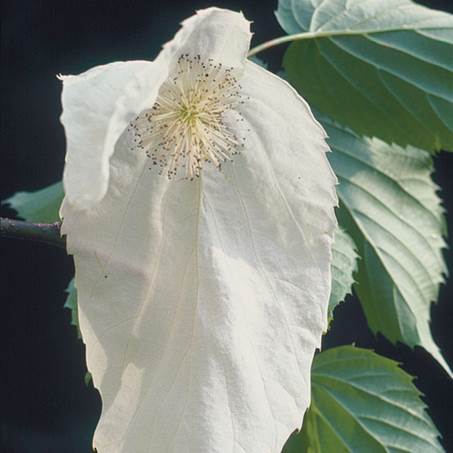
Davidia involucrata
This is a lovely species grown for its distinct pairs
of 7-inch-long, assymetrical white bracts which hang from the branches in
layers in late spring. Given room and maturity (seed-grown trees may not bloom
for up to 20 years), this plant is notable in both form and flower.
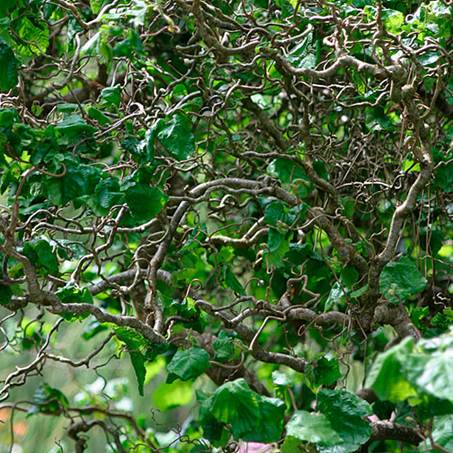
Corylus avellana 'Contorta'
This upright, tree-like shrub has heart-shaped, toothed,
mid-green leaves. Pendent yellow catkins are borne in late winter and early
spring. Strongly twisted, spiraling shoots provide year-round interest.
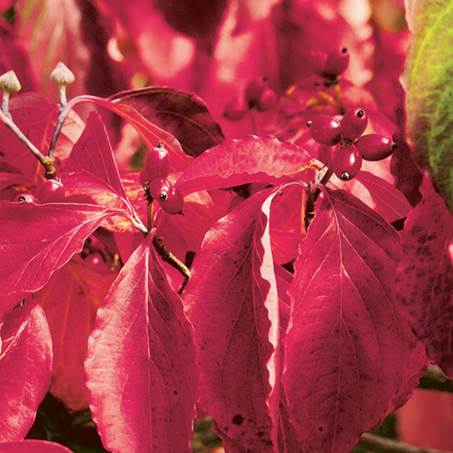
Cornus florida
This native flowering tree is best known for its early
spring blossoms, which are actually yellowish green flowers clustered in the
center of four showy, white to pink bracts 1-1/2 to 2 inches
long. Clusters of four bright red fruits mature in early fall, often
persisting into the beginning of winter.
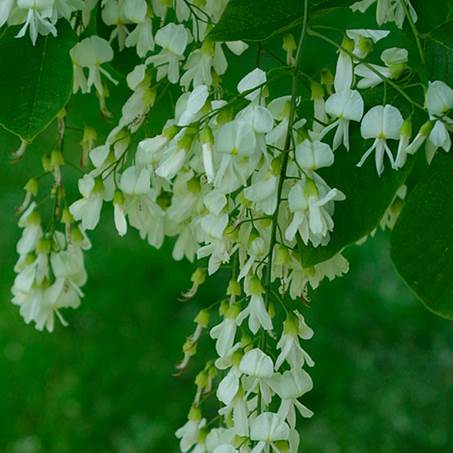
Cladrastis lutea
Yellowwood is a vase-shaped spreading tree with dark green
foliage that turns a delicate yellow or orange in the fall and smooth light
gray bark. Breathtaking, pendulous, foot-long, wisteria-like clusters of
fragrant white flowers appear in late spring and early summer, often in
alternate years.
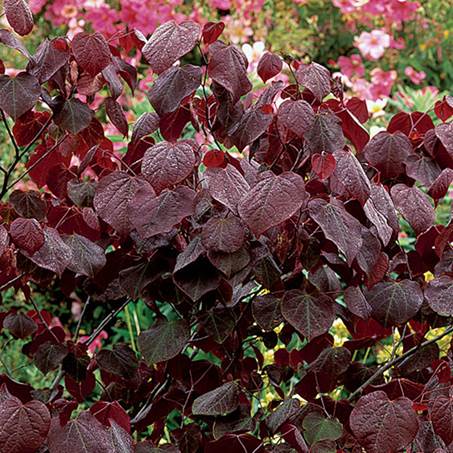
Cercis canadensis 'Forest Pansy'
In early spring, 'Forest Pansy' awakens with a long-lasting
profusion of bright purplish-pink blooms borne in clusters, before the leaves,
along smooth gray branches. Its heart-shaped, blood-red leaves are finely
veined and glossy when young, slowly turning a dark, purple-tinged green in
full sun. Autumn foliage is a bouquet of reds, purples, oranges, and yellows. The
plant's graceful branching structure stands out in winter.
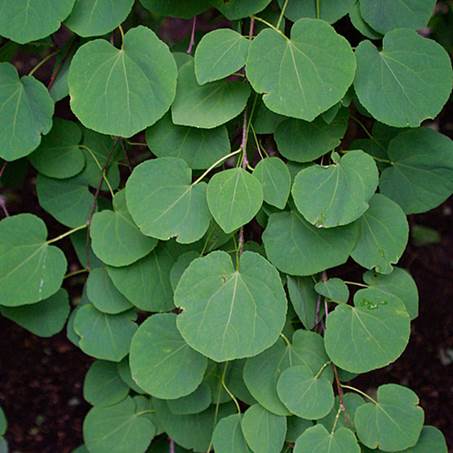
Cercidiphyllum japonicum f. pendulum
This deciduous small tree initially has a pyramidal
form, and later rounded. Cercis -like, opposite, heart-shaped
blue-green leaves are borne on stiff, slender, pendulous branches that fan out
from the crown and sweep the ground. Caramel-scented foliage emerges bronze or
purple-red, turns blue-green, then fades to gold or apricot in autumn. Tiny red
flowers emerge in late March or early April before the leaves.
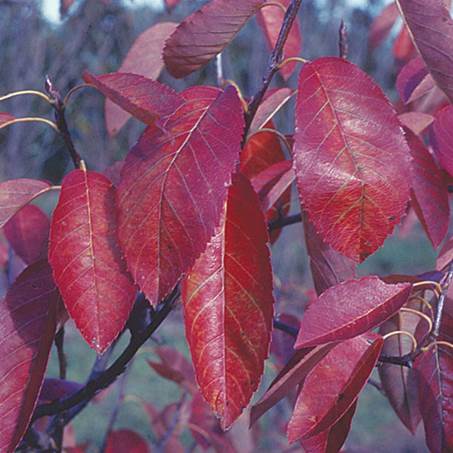
Amelanchier × grandiflora 'Autumn Brilliance'
This shrubby tree has leaves that emerge bronze, mature
green, and fade to orange and red in autumn. It bears 3-inch-long racemes of
white flowers in spring, followed by edible, juicy blue-black fruit.
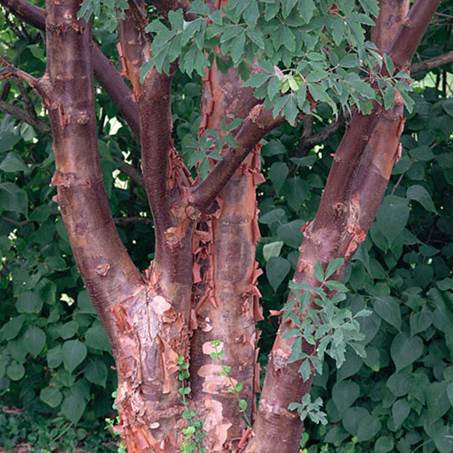
Acer griseum
This slow-growing understory tree has highly ornamental,
peeling orange-cinnamon bark. Its dark green, three-lobed leaves turn a
brilliant orange-red in autumn.
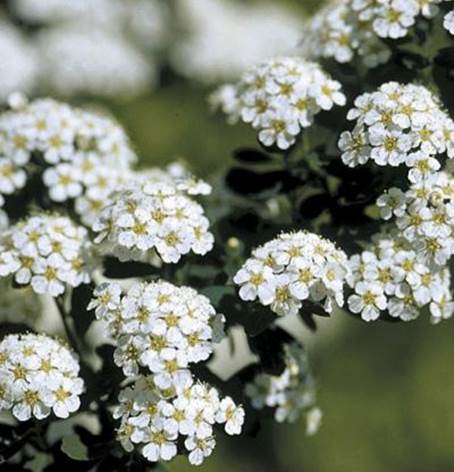
Spiraea nipponica ‘Snowmound’
This fast-growing, upright specimen has very attractive
small, blunt, dark blue-green leaves and arching branches. Bowl-shaped,
pure white flowers are borne midsummer in large numbers. They attract
butterflies.
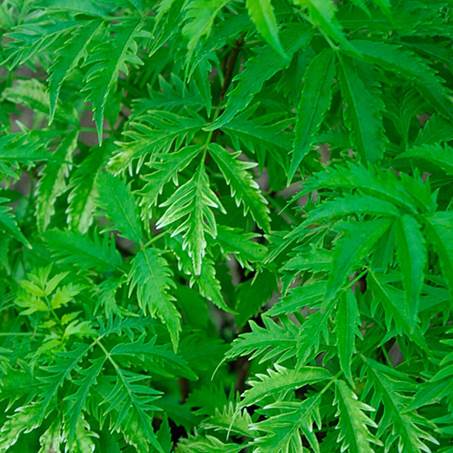
Sambucus racemosa ‘Sutherland Gold’
This choice specimen has a graceful habit with finely
divided golden foliage that emerges as bronze. It is less susceptible to
sun scorch than the other gold varieties. It bears creamy white flowers
that mature into red fruits.
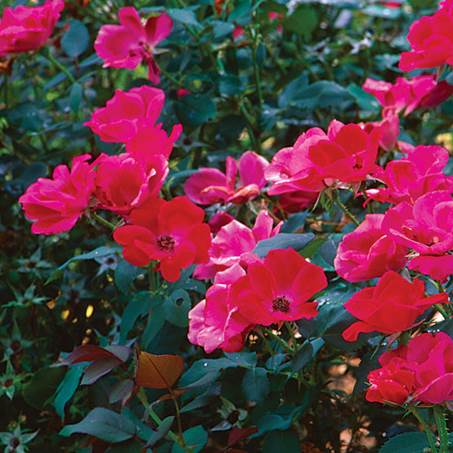
Rosa 'Radrazz'
Vibrant blossoms appear in spring and continue until frost.
In fall, the dark green foliage and hearty stems are edged with red.
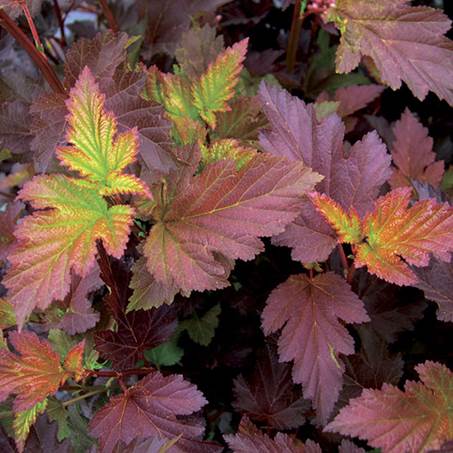
Physocarpus opulifolius 'Center Glow'
This ninebark's new leaves unfurl a golden yellow and then
mature to a rosy red-burgundy. Clusters of white blooms accompany the dramatic
foliage in early summer, followed by bright red seedheads that fade to tan.
'Center Glow' is a fast grower and an ideal candidate for mixed borders or
foundation plantings. It grows to 8 to 10 feet tall and almost as wide. In
winter, the older stems have attractive peeling bark.
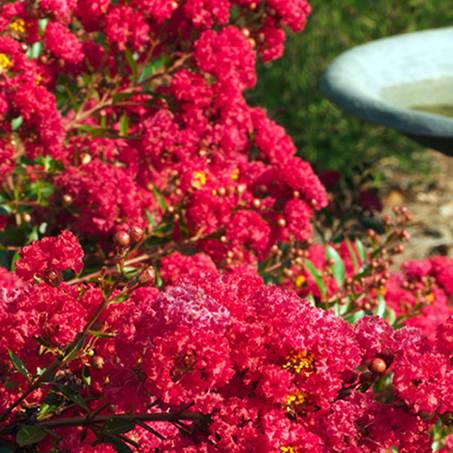
Lagerstroemia Cherry Dazzle
This compact shrub was bred by the noted horticulturist, Dr.
Michael Dirr. It was selected not only for its small stature but also for its
excellent disease resistance and standout flower color.
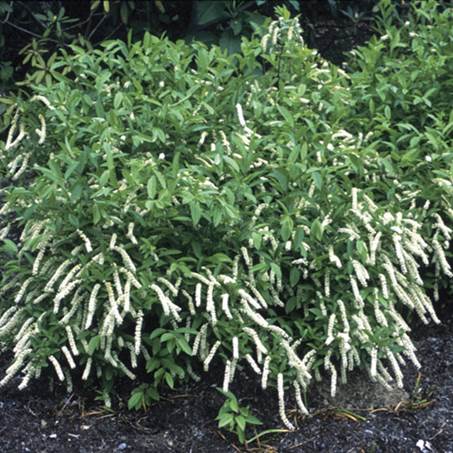
Itea virginica 'Henry's Garnet'
'Henry's Garnet' Virginia sweetspire is a very
dependable, showy plant. It is an arching, 3- to 5-foot-tall shrub that
holds its leaves well into fall, allowing the maroon, yellow, and orange tones
to develop and reveal themselves over time. Virginia sweetspire also produces
an early-summer show, featuring slender, drooping racemes of white flowers that
attract all sorts of pollinating insects. Its suckering, slowly spreading,
6-foot-wide habit makes it a good choice for slopes and mass plantings.
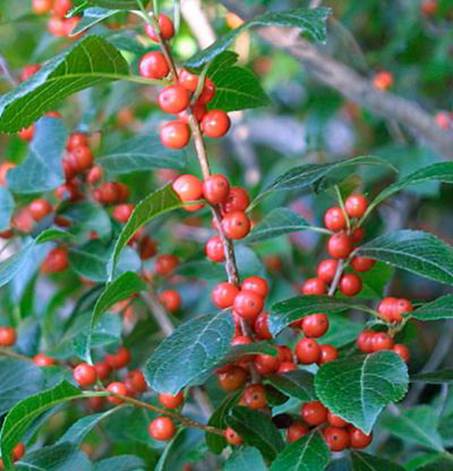
Ilex verticillata
This plant is a suckering shrub or small tree with toothed,
pointy, bright green leaves. It bears white flowers in spring, which are
followed by spherical dark red to scarlet berries that persist through the
winter. Some fruit ripens to yellow or orange.
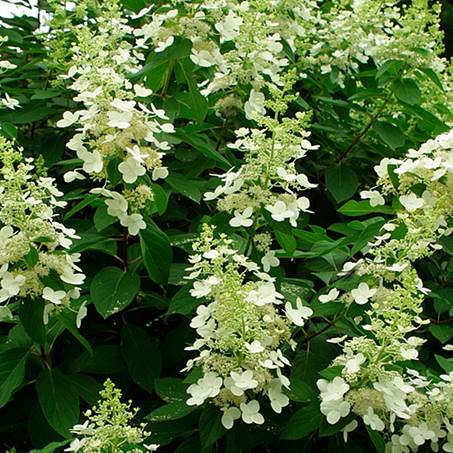
Hydrangea paniculata 'Tardiva'
'Tardiva' is a late-flowering (early to late autumn)
cultivar with loosely-packed, sharply pointed white flower heads that turn
purplish-pink with age. It is a vigorous, fast growing deciduous shrub that
reaches 8 to 12 feet tall.
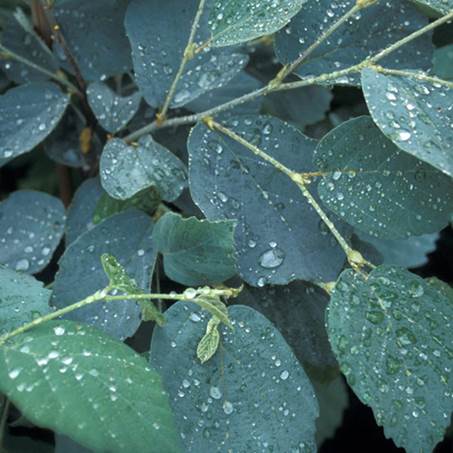
Fothergilla 'Blue Shadow'
These shrubs are beautiful, compact, and easy to grow,
making them obvious choices for mixed borders, foundation plantings, and
naturalizing. The fragrant, bottlebrush flowers are petalless and
sweetly-scented.
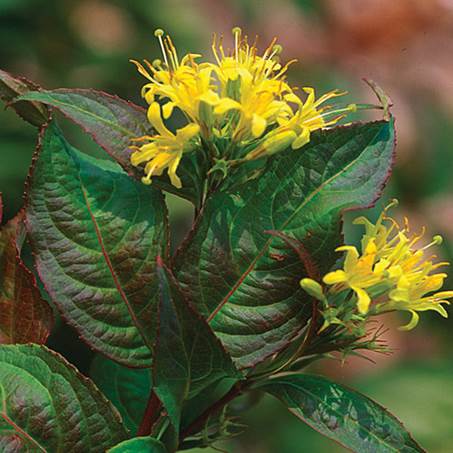
Diervilla sessilifolia 'Butterfly'
Southern bush honeysuckle has an attractive thicket-forming
habit. Glossy green leaves with tapered tips emerge tinged with bronze and
mature to mid-green on reddish stems. Sulfur-yellow flowers in
terminal clusters to 3 inches across appear in summer.
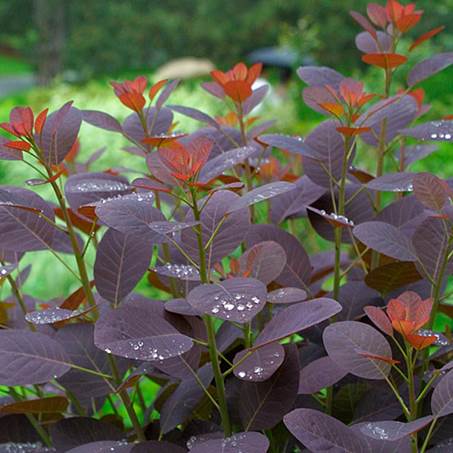
Cotinus coggygria ‘Royal Purple’
This shrub or small tree has stunning dark red-purple
foliage that turns scarlet in autumn. It has plume-like seed clusters,
which appear after the flowers and give a long-lasting, smoky haze to branch
tips.
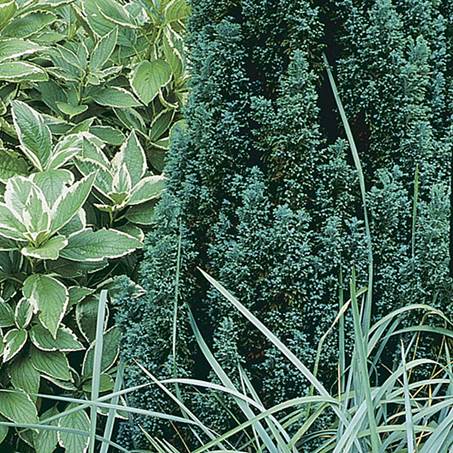
Chamaecyparis lawsoniana 'Ellwoodii'
This plant has a cypress-like, densely conical form
with erect feathery branches of ovate blue-gray juvenile leaves. Oblong
male cones emerge bluish black, opening brick red. Female cones are wrinkled
and reddish brown, to one half-inch. A native of western North America, it
is a very popular species since it is highly adaptable.
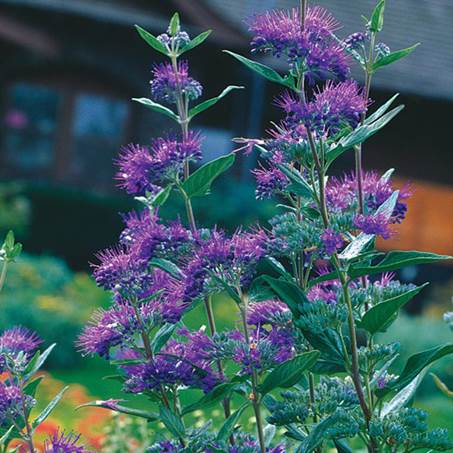
Caryopteris × clandonensis
These plants can take worst of the a hot summer
(heat, lack of water, and humidity) and still manage to perform well. They
generally live four to five years before they need replacing, but during that
time, they offer dependable foliage and pretty blue flowers from mid- to late
summer. Blue-mist shrubs form low-growing, finely-textured mounds and are
deer-resistant.
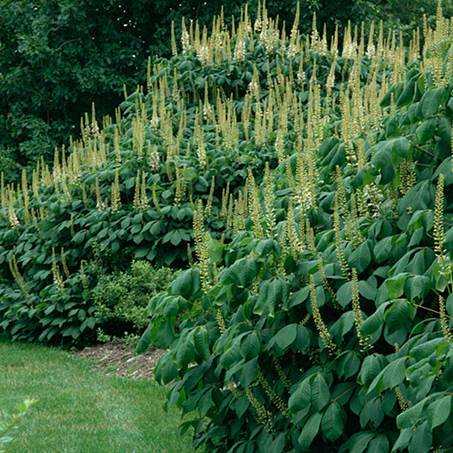
Aesculus parviflora
Large palmate-leaved shrub with showy white 12-inch-tall
blooms in summer, followed by smooth-skinned fruit. Leaves emerge bronze and
turn yellow in autumn.
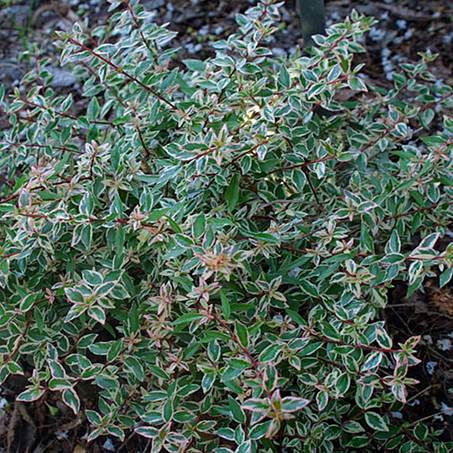
Abelia × grandiflora 'Confetti'
'Confetti' offers finely textured medium green foliage
variegated with creamy white and pink. Pale pink tubular flowers appear in late
summer or fall. This rounded, semi-evergreen shrub grows to about 3 feet tall
and 4 feet wide.